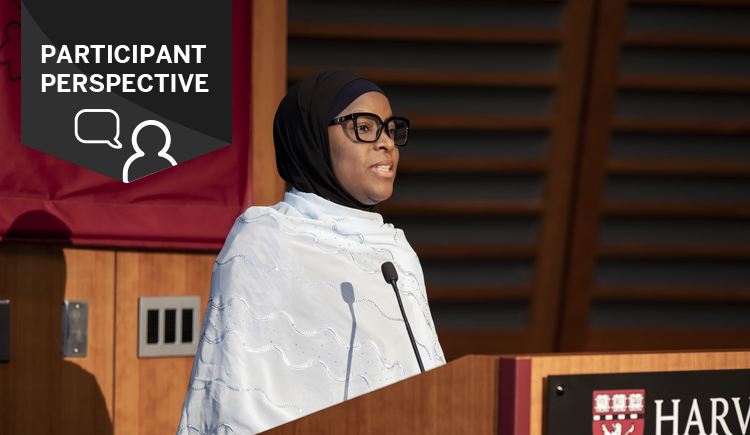
Information regarding COVID-19 has rapidly evolved. The content in this article provides a historical snapshot of events surrounding the date of posting.
Pregnancy and lactation experts Lauren Hanley, MD, medical director of lactation at Massachusetts General Hospital and assistant professor of obstetrics, gynecology, and reproductive biology at Harvard Medical School, and Melissa Bartick, MD, MSc, FABM, founder and co-chair of the Massachusetts Baby Friendly Hospital Collaborative and assistant professor of medicine at HMS, discuss the challenges health care teams face supporting new mothers during the COVID-19 pandemic.
This Q&A session was facilitated by Martina McGrath, MB, BCH, FASN, FRCPI, associate physician at Brigham and Women’s Faulkner Hospital and instructor of medicine at Harvard Medical School. The following article is an excerpt from this discussion recorded on April 15, 2020 that has been condensed and edited for clarity and accuracy.
What do we know about the management of labor and pregnant women internationally in the setting of COVID infection?
Dr. Hanley: Essentially, when we looked to the Chinese data, we saw many of the pregnant women coming in infected with COVID-19 were having a primary or repeat Cesarean section. Their published data showed about an 83% C-section rate, which is quite high and very different from the US in comparison to our pre-COVID Cesarean rates.
But, there are some considerations to be made when a pregnant woman is affected with COVID-19. There are some real practical considerations with respect to the organization of our teams in labor and delivery. At Massachusetts General Hospital, our labor floor has two separate operating rooms, with one room earmarked for COVID patients.
It is an intricate balance of teamwork between our anesthesia, neonatal, obstetric, and nursing colleagues when a Cesarean section is decided upon. Getting the patient from her room to the operating room is a complicated process. We need to be very proactive in getting our teams all together, getting everybody safely in their Personal Protective Equipment (PPE), and transporting the patient to the operating room.
These issues are really important. Perhaps that's why the Chinese ended up completing so many Cesarean sections on women who weren't even laboring.
When you think about the recovery from a Cesarean section versus a vaginal delivery, we really do hope that women can achieve vaginal deliveries and that not every COVID patient will go home also with the morbidity of a major abdominal surgery in addition to fighting the COVID disease.
Could you tell us more about what the controversies and opinions are in terms of managing breastfeeding in women who are COVID positive?
Dr. Hanley: The World Health Organization (WHO) has recommended continued rooming in of mothers and babies and using hand and respiratory hygiene. So, that is using a mask, using good hand hygiene, and normal breastfeeding, including skin to skin.
However, many other societies have gone in a different direction. The Center for Disease Control’s (CDC) original guidance favored separation and isolation. After reading those guidelines, many hospitals and other medical organizations followed suit.
As of last Thursday, these guidelines have evolved into another iteration from the CDC, which changes to a shared decision-making process. This allows the practitioners and teams to have good conversations with families to understand what their goals, their fears, what we know, and what we don't know about this really important topic.
Given the management practices as to how symptomatic mothers have been separated from their babies, do you think we have good data as to how newborns are affected?
Dr. Bartick: We do have data from Italy where there has been one death in their many thousands of cases. According to their website, they had north of around 20,000 cases. Johns Hopkins has reported they had 156,000 cases.
I think people were misinterpreting the CDC’s recommendations initially. Now, they're clearly recommending shared decision-making. The fundamental problem was many authorities were thinking of breastfeeding as disposable and not recognizing that not breastfeeding has risks.
Yet, we know that breastfeeding is like a baby's first vaccine. In this case, it's really essential. You can't say, well, we'll just do away with it, and we don't care. In this case, it's arguably a conservative strategy. If we don't know whether it's safe, maybe it's the safer thing to try to breastfeed a baby so that they're protected.
We know that breastfeeding is really the key public health strategy for infants in any emergency. And, this is an emergency. Even in a natural disaster or a pandemic, breastfeeding is very important.
One of the groups disproportionately affected by COVID are communities of color. Can you discuss what the concerns are around caring for mothers who are members of minorities and may be affected?
Dr. Bartick: The US black community has, unfortunately, the lowest breastfeeding rate of any demographic group. If separation of infected mothers is implemented, that is going to undermine that rate even further and potentially put those infants at further risk for COVID later.
We also know the incidence of COVID in that community is disproportionately high. So, it's really a double whammy. It just compounds the health disparities that we're already seeing.
Dr. Hanley: I'll build on that by adding that our Latinx population— we're seeing a disproportionate effect in our pregnant population at Mass General Hospital. Those families also have lower breastfeeding rates and increased risks of other comorbidities. We really do want to get breastfeeding off to the best start when it comes to protecting against metabolic disease for women and for their children.
I also want to discuss patients going home. We are actually expediting discharge for our COVID-positive patients and families. We want to get people away from the health care setting and back into their safe, insulated home. But a lot of these homes are not safe and insulated, and they're too small for proper distancing to occur.
When we're discharging COVID-positive women, we're recommending that they wear a face mask when they're feeding their baby, whether it be breast-feeding or pumping. But if they don't have a mask, then they can't comply with our recommendation. So, we're actually thinking about this from an insurance and donation standpoint. How can we get these families the supplies that they need?
Even pre-COVID, the first two weeks after a discharge is an extremely vulnerable time for a breastfeeding dyad. They need support in so many places, from the pediatrician, from their obstetrician or family medicine doctor, and from available lactation supports. Those things are all very challenged right now.
Obviously, social distancing is a massive challenge in terms of what is available for mothers at home within their communities. Can you speak to what you're seeing and any initiatives that are being developed to try to help?
Dr. Hanley: It is extremely common and culturally the norm for multigenerational support in new motherhood. I'm thinking about some really interesting seminars that I've attended at the Academy of Breastfeeding Medicine where they've discussed how all across the world; aunts, sisters, grandmothers, and many supports go into what we call the “fourth trimester.”
We're in the midst of a maternal mortality crisis. We're working very hard on supporting women in the immediate neonatal and in the early newborn period, women and babies. Now we're telling them not to have their mother come into the home because it's too dangerous. They're incredibly isolated.
With respect to what we're doing to help, I think nationally, there are programs that are getting up and running. There are virtual support groups that are coming online every day. We just created a document through the Mass Breastfeeding Coalition of virtual lactation support and virtual new moms’ groups so that we can try to get this information out.
The nice thing is you can attend a new mom’s virtual group in California on Zoom. It doesn't matter where it's being held. Hopefully, this assistance can cross state and even national boundaries. We can have people help each other through virtual mechanisms.


